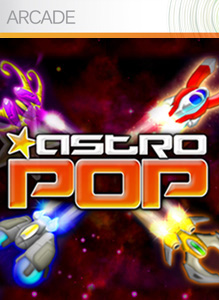| AstroPop | |
|---|---|
 Xbox Live Arcade cover art | |
| Developer | PopCap Games |
| Publishers |
|
| Designers |
|
| Engine | PopCap Games Framework |
| Platforms | PlayStation 2, Xbox, Adobe Flash, Windows, Xbox 360, Mobile |
| Release | April 6, 2004 |
| Genre | Puzzle |
| Mode | Single-player |
AstroPop (also written as astRO POP) is a 2004 puzzle video game developed and published by PopCap Games. The Adobe Flash version can be played online for free at several different websites, or a deluxe version can be downloaded and unlocked for a fee. The game was available for Xbox and Xbox 360 through Xbox Live Arcade. AstroPop was ported over to the PlayStation 2 in 2007 alongside another PopCap game, Bejeweled 2 which was released as a two-game compilation pack as PopCap Hits! Volume 1. The game has also been ported to cell phones.